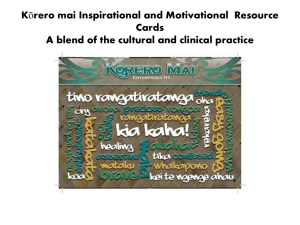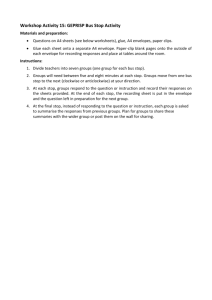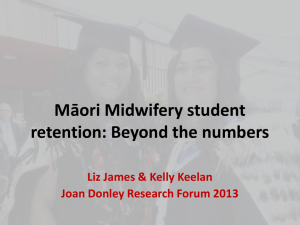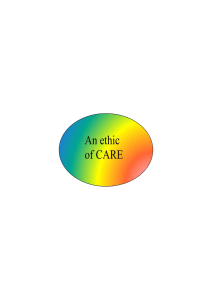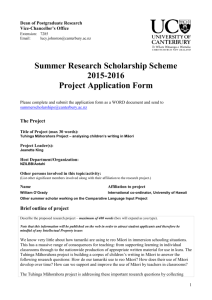Simon Lambert Kaitiaki Paerua/Māori Postgraduate Co-ordinator Student Services University of Canterbury
advertisement
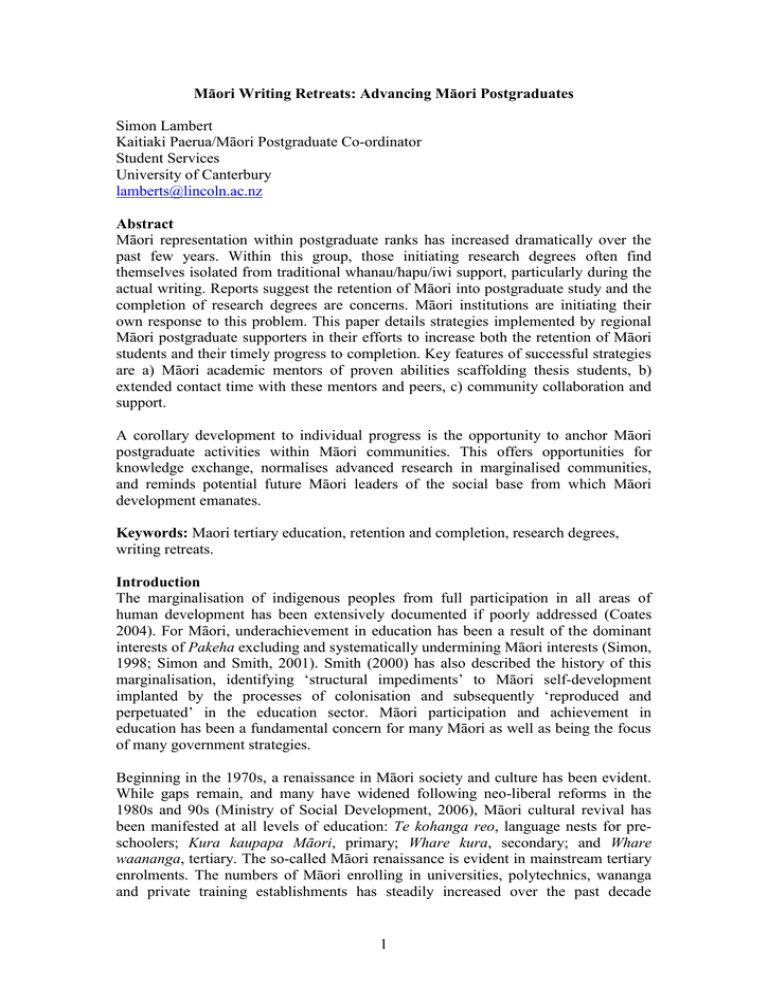
Māori Writing Retreats: Advancing Māori Postgraduates Simon Lambert Kaitiaki Paerua/Māori Postgraduate Co-ordinator Student Services University of Canterbury lamberts@lincoln.ac.nz Abstract Māori representation within postgraduate ranks has increased dramatically over the past few years. Within this group, those initiating research degrees often find themselves isolated from traditional whanau/hapu/iwi support, particularly during the actual writing. Reports suggest the retention of Māori into postgraduate study and the completion of research degrees are concerns. Māori institutions are initiating their own response to this problem. This paper details strategies implemented by regional Māori postgraduate supporters in their efforts to increase both the retention of Māori students and their timely progress to completion. Key features of successful strategies are a) Māori academic mentors of proven abilities scaffolding thesis students, b) extended contact time with these mentors and peers, c) community collaboration and support. A corollary development to individual progress is the opportunity to anchor Māori postgraduate activities within Māori communities. This offers opportunities for knowledge exchange, normalises advanced research in marginalised communities, and reminds potential future Māori leaders of the social base from which Māori development emanates. Keywords: Maori tertiary education, retention and completion, research degrees, writing retreats. Introduction The marginalisation of indigenous peoples from full participation in all areas of human development has been extensively documented if poorly addressed (Coates 2004). For Māori, underachievement in education has been a result of the dominant interests of Pakeha excluding and systematically undermining Māori interests (Simon, 1998; Simon and Smith, 2001). Smith (2000) has also described the history of this marginalisation, identifying „structural impediments‟ to Māori self-development implanted by the processes of colonisation and subsequently „reproduced and perpetuated‟ in the education sector. Māori participation and achievement in education has been a fundamental concern for many Māori as well as being the focus of many government strategies. Beginning in the 1970s, a renaissance in Māori society and culture has been evident. While gaps remain, and many have widened following neo-liberal reforms in the 1980s and 90s (Ministry of Social Development, 2006), Māori cultural revival has been manifested at all levels of education: Te kohanga reo, language nests for preschoolers; Kura kaupapa Māori, primary; Whare kura, secondary; and Whare waananga, tertiary. The so-called Māori renaissance is evident in mainstream tertiary enrolments. The numbers of Māori enrolling in universities, polytechnics, wananga and private training establishments has steadily increased over the past decade 1 (Jeffries, 1997). However, Māori tertiary graduates have historically been weighted towards lower level qualifications. Ministry of Education figures (2006: 106) paint a broad picture of the Māori postgraduate context: Māori make up 8.8% of all postgraduate students (comprising 0.6% of the Māori pop., compared to 1.0% the rest of New Zealand); 42% are doing Masters studies, 10% doctorates; 80% are enrolled in a university, 7% in wananga; Wahine (women) outnumber tane (men) by 2:1, and are more likely to complete; 33% are studying society and culture; 18% management and commerce; 15% health; 12% education; 5 year completion rate for Māori at university is 53%, 29% at wananga. Furthermore, while nearly 10% of Pakeha domestic students completed postgraduate degrees in 2004, only 2.7% of Maori students managed this (Smart, 2006: 21). While the numbers of enrolled Māori students may have increased, those initiating research degrees may find themselves isolated both within their tertiary institutions and from traditional whanau/hapu/iwi support (Reid, 2006). Within tertiary student support services, concern has been expressed on progress, supervision, poverty, and increased pressures from family and work (ibid, see also Armstrong, 2004). Of course, such experiences are by no means confined to Māori. However, with Māori predicted to comprise 17% of New Zealand‟s population by 2026 (Ministry of Education, 2006), and given the integral role an educated population has in contemporary development issues (Clarke, 2007), the poor representation of Māori in postgraduate studies has serious implications for New Zealand. Universities and polytechnics have sought to support Māori by a wide range of strategies and tactics that involve Māori and non-Māori staff and students. Often these initiatives have relied on the goodwill and unpaid efforts of Māori themselves. Even the simplistic exercise of conducting Treaty workshops for new staff have, at one South Island university, declined from 9 such workshops in 2005 to just one by June 2007 (University of Canterbury, 2007: 28). The author‟s experience of working as a Maori postgraduate advisor in that same institution is of poorly supported, poorly understood short-term, fixed-contract work. However, the example that follows shows that positive outcomes are possible and is drawn from the author‟s experiences as a member and coordinator of a regional Māori doctoral support programme, and as an employee contracted by a tertiary institution to coordinate support for Maori postgraduates. The Māori and Indigenous (MAI) Doctoral Support Programme: a brief history. MAI developed from a Masters-level tutoring programme that operated at the School of Education at the Auckland University in the 1990s. It involved passionate Maori postgraduates and their supporters working closely in support of each others studies, juggling the demands of whanau and institution to complete research qualifications. Following a successful 2002 bid for Centre of Research Excellence funding (CoRE) by Nga Pae o te Maramatanga (also based at Auckland University), MAI has been run as a national programme. There are six sites: Mai ki Tamaki Makaurau (University of Auckland), MAI ki AUT (Auckland University of Technology), MAI ki Waikato (Waikato University), MAI ki Poneke (Victoria University Wellington), MAI ki Otautahi (Christchurch), and MAI ki Otakou (Otago University) (see Figure 1 below). 2 Each site draws in students from a wide academic „hinterland‟. For instance, the Christchurch site has students and staff who are enrolled in three different tertiary institutions; from 2006, the South Island sites of Otautahi and Otakou were administered by Te Tapuae o te Rehua as the Tu Mai Paerua programmer. In 2006, the national network was retitled MAI Te Kupenga: the National Programme for Māori and Indigenous Post-Graduate Advancement. Figure 1: MAI Te Kupenga sites (NB: Mai ki AUT is also located in the Tamaki region). Source: MAI TE Kupenga webpage http://www.arts.auckland.ac.nz/sites/index.cfm?S=M_MAI Nga Pae has initiated a number of support programmes for Māori researchers and postgraduates, research funding, scholarships/fellowships, post-doctoral funding, knowledge exchange support, regular conferences and publishing options. Writing retreats, where students and staff spend time alone and together discussing and undertaking their writing, have also become an important part of the support and networking opportunities offered by Nga Pae. Two subtly different retreats will be discussed in some detail next. Māori Writing Retreats Nga Pae o te Maramatanga initiated an annual retreat at Hopuhopu, utilising the wellappointed facilities developed by Tainui. The purpose of the retreat was to provide „quality conditions and stimulation‟ for Māori doctoral students to complete a „substantial piece of scholarly writing‟ (Nga Pae o te Maramatanga, 2003). The first retreat was held from January 28 to February 5 in 2004, with attendees choosing the length of their commitment and being responsible for travel to Hopuhopu. Meals and single rooms are provided, with meals being communal but with no compulsion to join. People are instead encouraged to make the most of their „isolation‟ and complete pre-planned writing goals, whether to complete a proposal, a thesis chapter, or a paper for publication. 3 As a part of the support offered to postgraduates who attend Hopuhopu, seminars are held on fundamental postgraduate issues such as supervision, writing skills, and working with Māori communities. Opportunities for networking with senior Māori academics are also important, not least to demystify the process of doctoral research. Significant numbers of Māori staff and students meet to discuss their work; the second retreat saw a total of 35 Māori doctoral candidates attend. The support offered through these writing retreats mirrors the scaffolding instruction described by Vygotsky as the “…role of teachers and others in supporting the learner‟s development and providing support structures to get to that next stage or level” (Raymond, 2000: 176). Scaffolding is intended to be temporary with support progressively withdrawn as the learner‟s abilities increase. The external scaffolds can be removed because “…the system of knowledge itself becomes part of the scaffold or social support for the new learning” (ibid.). A second example of a Māori writing retreat has been initiated by the South Island sites, i.e., Otautahi and Otakou, in conjunction with MAI ki Poneke. The inaugural event was held at Takahanga marae, Kaikoura, over four days in May 2006. Three staff and ten students were accommodated within the whare nui, with tables for writing set up in a large adjoining room. Meals were communal, with everyone attending; tangata whenua passed through and joined students for meals and conversation. Students at Takahanga were surveyed by the coordinators to aid planning for subsequent retreats. Responses were universally positive, describing how the experience contributed to their understanding of their own research and possible career pathways. For example, one student commented on what they found valuable. Meeting new people in different areas of research and discussing similar problems that occur across the board. I found it great to get some perspective on my thesis as well as some new ideas on pursuing an academic career. I also enjoyed discussing Kaupapa Māori research techniques as a different approach that can be employed in research and also seeing its application in not only the social sciences. Networking with peers was also mentioned as an important outcome: The opportunity to meet other PhD students and hear their stories. Each time I had discussions with students about their research the more it became evident that one day we will have network and potential collegial opportunities in the work context. The highlight of the Takahanga retreat were opportunities for interaction with tangata whenua, the local Māori community, who organised a short fieldtrip around several local resource management projects that were components of one MAI student‟s PhD research. As one student said of these interactions: Such events remind me of why I’m doing what I’m doing. He tāngata, he tāngata, he tāngata. 4 It is this potential for writing retreats to offer opportunities for contact between Māori communities and Māori postgraduates that is a considerable advance on the support historically offered by tertiary institutions who themselves have minimal contact with these communities. Indeed, such experiences could be said to extend the concept of scaffolding to the area of cultural resilience. Such resilience contributes to a broader interpretation of sustainability by valuing cultural diversity (World Commission on Culture and Diversity, 1995) in the manner by which biodiversity is valued. Through extended contact between Maori communities and Maori thesis students, communities begin to offer the expertise of their local resource management to broaden the professional development of those Maori postgraduates who intend to continue their careers in working alongside Maori communities. Conclusion In response to the difficulties experienced by Māori postgraduates within New Zealand tertiary institutions, Māori themselves have attempted to provide peer support to those Maori students attempting theses. The establishment of regular writing retreats for Māori thesis students marks a significant advance in this support, and stems from the establishment of targeted resourcing for Māori research and a realisation of the importance of initiating networking opportunities for Māori students who are isolated within their institutions. The support provided through writing retreats takes the form of expert advice, peer support and the provision of time and space in which Maori cultural practices are both possible and encouraged. This paper has presented two examples of writing retreats for Māori doctoral candidates. Hopuhopu is a regular event and attracts significant numbers of Māori staff and students; important outputs include papers that are intended for publication as well as progress towards theses completion. The South Island/Te Wai Pounamu retreat is smaller and more intimately linked with tangata whenua development. Locations for this event will move around Te Wai Pounamu and seek to build on links with local communities and demonstrate the positive effects of collaboration between Māori postgraduates and Māori communities, helping to anchor the work of the former within the needs of the latter. References Armstrong, S.J. (2004). The impact of supervisors‟ cognitive styles on the quality of research supervision in management education. British Journal of Educational Psychology, 74, 599–616. Clark, H. (2007). Address to the International Confederation of Principals‟ World Convention. Retrieved September 24th, 2007, from http://www.beehive.govt.nz/ViewDocument.aspx?DocumentID=28974 Coates, K. S. (Ed.). (2004). A Global History of Indigenous Peoples: Struggle and Survival. Basingstoke and New York: Palgrave MacMillan. Jefferies, R. (1997). Māori Participation in Tertiary Education: Barriers and Strategies to Overcome Them. Wellington: Kokomuka Consultancy/Te Puna Kokiri. 5 TE Kupenga o MAI (2007) The National Programme for Maori and Indigenous Postgraduate Advancement. Retrieved September 24th, 2007, from http://www.arts.auckland.ac.nz/sites/index.cfm?S=M_MAI Ministry of Education (2006). Nga Haeata Matauranga: Annual report on Māori Education. Wellington. Nga Pae o te Maramatanga (2003). National Writing Retreat for Māori Doctoral Candidates [Electronic version]. Retrieved September 25, 2007, from http://www.vuw.ac.nz/mai/news/NPM3NewsletterDec03.pdf Raymond, E. (2000). Cognitive Characteristics. Learners with Mild Disabilities (pp. 169-201). Needham Heights, MA: Allyn & Bacon, A. Pearson Education Company. Reid, J. (2006). Barriers To Maori Student Success At The University Of Canterbury. Unpublished master‟s thesis, University of Canterbury, Christchurch, New Zealand. Available from the Australasian Digital Theses Program http://digitallibrary.canterbury.ac.nz/data/collection3/etd/adt%2DNZCU20061010.111647/ Simon, J. A. (1998). Anthropology, 'native schooling' and Māori: the politics of cultural adaption' policies. Oceania, 69(1): 61-78. Simon, J. A. and Smith, L.T. (Eds.). (2001). A Civilising Mission? Perceptions and Representations of the New Zealand Native Schools System. Auckland: Auckland University Press. Smart, W. (2006).Outcomes of the New Zealand Tertiary Education System: A synthesis of the evidence. Wellington: Ministry of Education. Smith, G. H. (2000). Māori Education: Revolution and Transformative Action. Canadian Journal of Native Education, 24(1), 57-72. University of Canterbury (2007). Statement of Service Performance End of Second Quarter Report: As at 30 June, 2007. Retrieved September 15, 2007, from Canterbury University website http://www.canterbury.ac.nz/piru/documents/ssp/ssp_q2_2007.pdf World Commission on Culture and Development (1995). Our Creative Diversity. Paris: The World Commission on Culture and Development. 6
